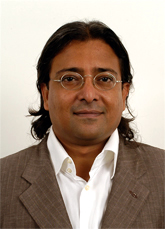UNESCO Intersectoral Platform: Fostering ICT-enhanced learning

- © UNESCO
- Indrajit Banerjee DIR/CI/INF
This Intersectoral Platform will involve three major programmes, Education, Science and Communication and Information, that will work towards the inclusion of all learners through information and communication technologies (ICTs), the reinforcement of quality education and training for all, and lifelong learning through the innovative integration of locally relevant ICTs into teaching and learning processes. This shall include Open Access modalities by building communities of practice, global digital libraries and resource centres and digital learning tools. In general, the educational value of alternative and ICT applications shall be explored.
The three sectors (CI, ED, SC) agreed to demonstrate a model of intersectoral cooperation by applying a phased partnership-building strategy and by using technology to enhance efficient interaction, knowledge sharing and cooperation within UNESCO. The clarification of each sector's role and effective modalities of cooperation shall bring about the emergence of an "intersectoral team of excellence" possessing truly complementary assets and skills and thereby contributing to building the right mix of human, institutional and technology bridges.
The strategy will focus on creating synergies, maximizing the use of existing assets, avoiding duplication and reducing costs by enhancing collaboration with respect to on-going sectorial activities. The potential of multi-purpose community-based centres, such as Community Learning Centres (CLCs) and Community Multimedia Centres (CMCs) and Virtual Campuses as knowledge providers and tools for development and poverty eradication will be fully explored. In this context, new approaches will be devised which encourage lifelong learning opportunities, create and reinforce literate environments, foster income-generating activities and possibly train teachers.
The development of such new approaches to knowledge dissemination and utilization will include new models of open and distance learning (ODL) benefiting lifelong learning. The strategy will focus on fostering the use of ICTs in teaching and learning, including the establishment of standards to strengthen ICT competencies for teachers and researchers and the development of strategies and best practices, resources and capacities for integrating Free and Open Source Software (FOSS) and open educational resources (OER) in learning processes. This platform will further underpin UNESCO's role as global facilitator for the implementation of the World Summit on the Information Society (WSIS) Action Line C7 "E-learning".
Lead ADG: Jānis Kārkliņš, ADG/CI
Platform Manager: Indrajit Banerjee DIR/CI/INF
Expected results for 2008-2009

